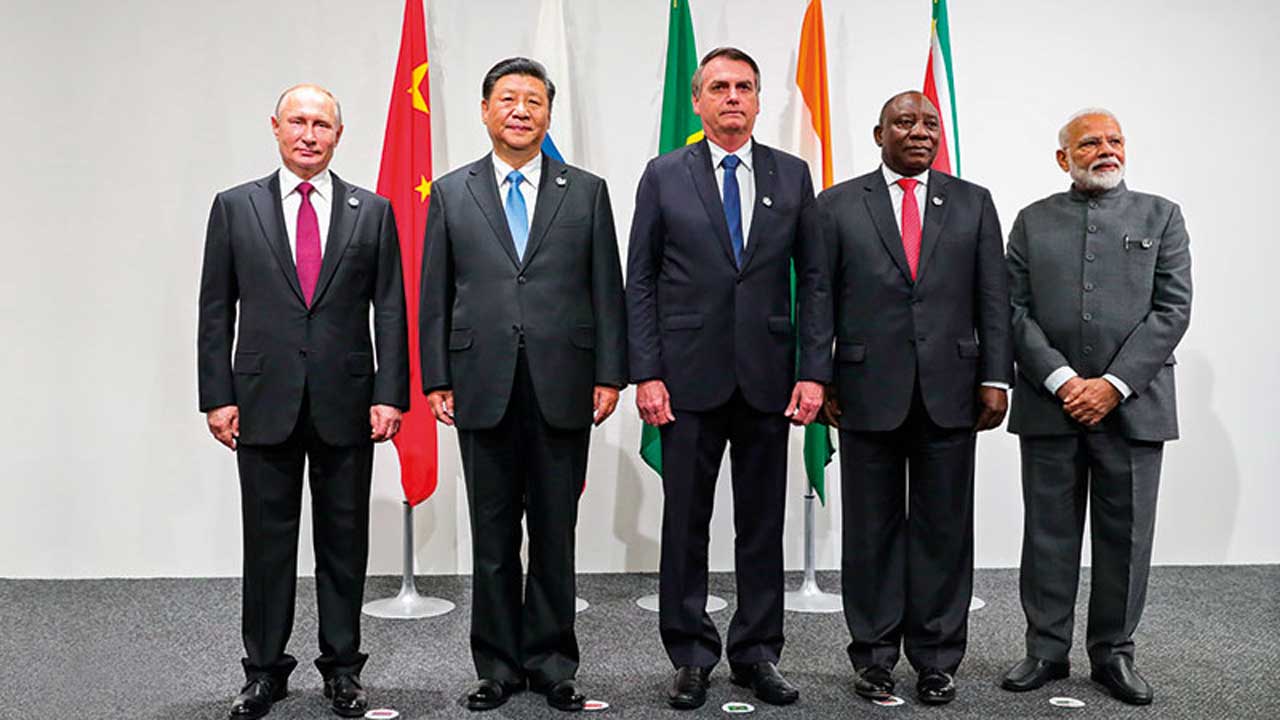 Nigeria may not have expressly shown her interest to be a member of BRICS, a coalition of five countries motivated to work together for rapid development purposes; but it is clear that such a membership would be of immense benefits to Nigeria, in addition to signposting her as a respectable force in the comity of nations.
Nigeria may not have expressly shown her interest to be a member of BRICS, a coalition of five countries motivated to work together for rapid development purposes; but it is clear that such a membership would be of immense benefits to Nigeria, in addition to signposting her as a respectable force in the comity of nations.
However, that innate desire, to be realized, requires Nigeria to up her social, economic and political ante well beyond the present below par level.
Increasingly, the global order is inclining into a de-centred one. Put in other words, multipolar world order is emerging amidst the illusion of an American century. Other great powers in the international system are contesting the post-second world war and post-bipolarity global order and its oppressive and domineering dynamics. Countries like Brazil, China, India, and Russia, are some of the key players in the emerging order.
They have rallied themselves into a concert of economic powers to rival the Washington consensus of the West. In 2009, that impulse was given concrete expression with the formation of BRIC, an acronym for the global leading emerging markets that include Brazil, Russia, India, and China. It was later expanded to BRICS with the ascent of South Africa to the group in 2011.
BRICS aims to promote peace, security, development, and cooperation free from the strictures of the global hegemons built around the trilateral power of the United States, Japan, and west Europe with a view to “contributing significantly to the development of humanity and establishing a more equitable and fair world.” China is the second largest economy in the world, Brazil is ranked the sixth largest economy, Russia is currently the ninth-biggest economy, and South Africa is ranked as the 26th-largest economy and most industrialised in Sub-Saharan Africa.
The group share of global output is estimated to reach one-third by 2030. It accounts for about 17 per cent of world trade and has a combined foreign reserve estimated at US$4 trillion. BRICS countries occupy 30 per cent of the global territory and constitute about 45 per cent of the global population. To be sure, countries in the group have essayed at coordination of their positions and actions in international organisations, as seen in the United Nations. In 2014, it announced its mission to duplicate the institutions of global governance such as the Bretton Woods Institutions, and create an alternative reserve currency for global exchange. Therefore, BRICS is an alternative power centre in the international system. It is an assembly of countries desirous of freeing themselves from the prevailing unjust international order in favour of one based on fairness.
Unfortunately, Nigeria has not joined this group because of obvious national fundamentals that are largely in deficit. As some informed observers have posed the question, what is Nigeria bringing to the table given the reality that most of the core countries in BRICS are industrialised? Nigeria’s singular linkage to the global economy is oil, and that has itself become a resource curse. With an OPEC allocation of about 1.8 million barrels per day, the country is barely able to meet the quota in an industry where oil theft is put daily at about 360, 000 barrels.
So membership of an international organisation should not be about loafing but for purposeful actors, an attribute which unfortunately Nigeria lacks today. Nevertheless, Okonjo-Iweala, former Minister of Finance, had once pointed to our potential as a candidate for the BRICS club. She had noted that “we don’t like to feel left out because we know we are going to get there. I mean Nigeria has all the fundamentals to be one of the BRICS. And I think that I always have this one saying that ‘if you are not in Nigeria … you are not in Africa’ because our fundamentals, that we are the largest country in terms of population, we are growing at a very respectable rate of 7 per cent and better for the past couple of years, and we have got the natural resource base but also the human resource base to be able to do better.”
Sadly, Nigeria is not a candidate for BRICS given its current bleak economic fundamentals in a context in which other countries like Iran and Argentina are said to have applied for membership, and others, namely, Bangladesh, Indonesia, Mexico, Turkey, Egypt, Algeria, Sudan, Syria, Saudi Arabia, Pakistan, Venezuela, and Nigeria have also evinced interest in enlisting into the club.
Today, it is not clear what the thrust of Nigerian foreign policy is. What does the country need? What are its projections? it is so vacuous that observers draw on its past policies to hazard a guess about its intentions in the external environment. This is unfortunate for a country that was once a frontline state in the fight against apartheid South Africa, and which supported the liberation struggles of many African countries that were under colonial rule. Again and again, it is unfortunate for a country that played a significant role in peace-keeping operations under the auspices of the United Nations. And most spectacularly, it halted the civil war in Liberia and Sierra Leone and installed democratic regimes.
With prevailing leadership that has made the country look big for nothing, this situation in relation to its external environment, is hardly surprising. The structure of the state is in contention, and non-state actors have inflicted on the country negative sovereignty. And this is compounded by a lack of productivity and elite depravity. In sum, Nigeria lacks soft and hard power that can endear it to purposeful international organisations. This should worry President Muhammadu Buhari and the country’s entire leadership at all levels.






